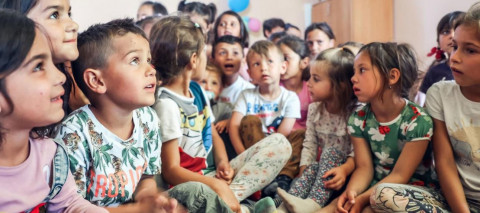
GCED Basic Search Form
Quick Search
현재 위치
뉴스

29 August 2023 / Culture and Education
Ukrainian children are showing signs of widespread learning loss as Russia’s invasion preceded by the COVID-19 pandemic have left them facing a fourth year of education setbacks, a senior UN children’s agency official said on Tuesday.
“Inside Ukraine, attacks on schools have continued unabated, leaving children deeply distressed and without safe spaces to learn”, declared Regina De Dominicis, UNICEF Regional Director for Europe and Central Asia, who recently returned from the country.
“Not only has this left Ukraine’s children struggling to progress in their education, but they are also struggling to retain what they learnt when their schools were fully functioning,” she said.
Going backwards
According to the latest survey data, up to 57 per cent of teachers report a deterioration in students’ Ukrainian language abilities, up to 45 per cent of educators point to a reduction in maths skills, while 52 per cent report a reduction in foreign language abilities.
Only a third of children of primary and secondary age are learning fully in-person. Another third of enrolled students are learning through a mixed approach of in-person and online, and one-third are fully remote.
Online learning can complement in-person learning and provide a short-term solution, but it cannot fully replace in-person classes, which are especially critical for social development and foundational learning among young children, said the UNICEF Director.
According to national survey data, two-thirds of preschool-age children are not attending any kind of learning facility. In frontline areas, three-quarters of parents report not sending their children to preschool, UNICEF noted.
Half of child refugees out of school
For Ukraine’s refugee children, there is yet more uncertainty, with more than half of children from preschool to secondary school not enrolled in national education systems across seven countries hosting refugees.
Pre-schoolers and secondary-age students are the most likely to miss out. Language barriers, difficulty in accessing school, and overstretched education systems are among the contributing factors, said UNICEF.
Some young refugees are likely attempting to study online, either via the Ukrainian curriculum or through other distance learning platforms whereas others may have completely abandoned their education, the agency warned.
In times of crisis or war, schools provide far more than a place of learning, Ms. De Dominicis said. They can provide children who have already endured loss, displacement and violence with a sense of routine and safety, a chance to build friendships and get help from teachers.
They can promote access to vaccines, nutrition and services to support mental health and well-being.
Government alliance
UNICEF is working with governments and partners on the ground in Ukraine and countries hosting refugee children and families to help increase access to quality learning.
They agency is also working with the Ukrainian Government to support learning recovery and alignment with regional standards to remove barriers to education and ensure lifelong learning for all.
This includes rehabilitating schools and providing much needed catch-up classes in core subjects, with the aim of supporting 300,000 children at risk of learning losses in Ukraine over the coming school year.
